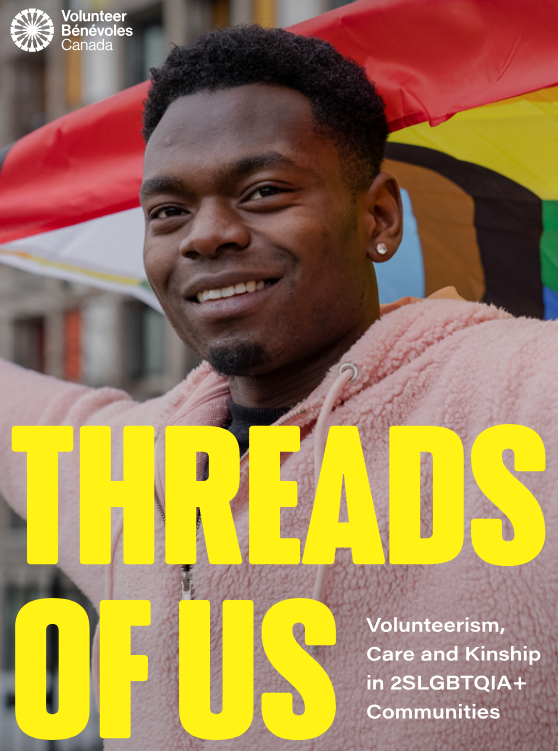General news: 2SLGBTQIA+ seniors
Recent General news: 2SLGBTQIA+ seniors

Threads of Us: Volunteerism, Care and Kinship in 2SLGBTQIA+ Communities
Report (pdf), Volunteer / Bénévoles Canada, 2025
Contents:
Introduction
Archiving Queer Histories: Volunteer Contributions to Preserving 2SLGBTQIA+ Narratives and Memories
Ecosystems of Care: How Volunteers Sustain Trans Health and Legal Advocacy
Volunteering as Kinship: Chosen Families in 2SLGBTQIA+ Communities
Solidarity in Action: Mutual Aid, Redistribution and Care in 2SLGBTQIA+ Communities
Conclusion
Excerpt [p. 28]: ... For queer elders, especially those who have outlived partners and been cut off from biological family, these networks can be a lifeline. In Vancouver, Dignity Seniors Society’s volunteer-run We Are Familee program helps 2SLGBTQIA+ seniors age in place.
In Toronto, intergenerational volunteers with the Senior Pride Network [now: Senior Pride Network Canada / Réseau de la Fierté des personnes aînées du Canada (SPNC/RFAC)] offer everything from advocacy to end-of-life planning support in ways that honour chosen family as real and vital.
Whether it’s accompanying someone to an appointment or just spending time together, these efforts help preserve dignity, community memory, and mental health. These networks don’t just provide companionship, they reduce isolation, preserve community memory, and contribute to better mental health outcomes for queer seniors. ...

National group SPNC/RFAC: July 2025 Newsletter
Welcome! As the warmth of summer embraces us, we hope you're all enjoying a great start to the season. In this July newsletter, we're pleased to provide you with information and resources that we believe are relevant to our communities of older 2SLGBTQI+ individuals across the country. 🏳️⚧️ 🏳️🌈 🇨🇦
Read our July 2025 Newsletter here (English / français)!
About SPNC/RFAC
Senior Pride Network Canada / Réseau de la Fierté des personnes aînées du Canada (SPNC/RFAC) exists to unite, advocate for, and empower older, senior, and elder 2SLGBTQI+ people across Canada.
Our mandate is to unite non-profit organizations, formal and informal groups, projects, and individuals who work directly for and with older 2SLGBTQI+ people across the country to champion the well-being of 2SLGBTQI+ older adults. To do this, we prioritize research, education and support initiatives ...
Dignity Seniors Society (DSS) is a co-founding member of SPNC/RFAC. DSS Project Lead Victoria Stuart is the B.C. Representative to and co-Chair of SPNC/RFAC.

Reframing Ageing: British Columbians’ Thoughts on Ageism
Office of the Seniors Advocate
2025-Mar-26
In November and December 2024, the Office of the Seniors Advocate launched a survey and asked British Columbians of all ages to share their perceptions and experiences with ageism, and whether it has impacted their lives.
The survey found 84% of 9,200 respondents believe ageism in an issue in B.C. and 54% reported being directly impacted by ageism.
This report summarizes the feedback through five themes: social inclusion, employment, health care, the media, and safety, and includes the experiences shared by British Columbians.
Ageism and ageist attitudes are noticed most often in the workplace, exclusion in social situations and many older people report feeling dismissed and invisible.
The report suggests some next steps for individuals, organizations and governments to begin to address ageism including:
Increasing public awareness and education and working to dispel negative stereotypes;
Encouraging all levels of government to ensure laws and policies protect and enable older people to live in dignity and security;
Implementing education and training to ensure health care providers are promoting age-inclusive practices; and
Creating opportunities for positive inter-generational activities and programs to increase understanding between people of all ages.
